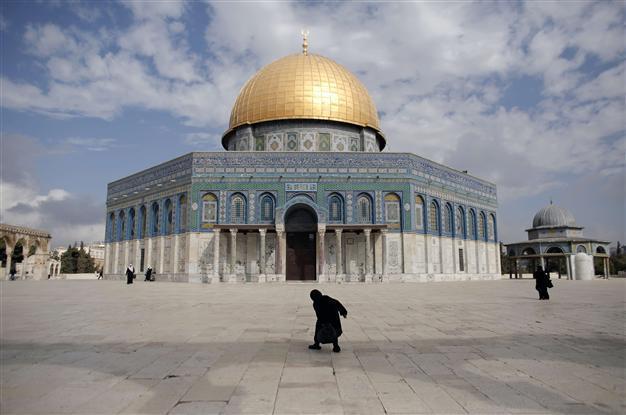Israel says no plan to allow Jews to pray at Al-Aqsa
JERUSALEM - Agence France-Presse

AFP Photo
Israel on Oct.22 reassured Jordan that it would not allow Jewish prayer at Jerusalem's flashpoint Al-Aqsa mosque compound, after reports of a possible change raised concerns in the Arab world.
"There is no intention of changing the status quo on the Temple Mount," a source in the office of Prime Minister Benjamin Netanyahu said, using the Israeli term for the compound which is located in the Old City.
The plaza is often at the centre of tensions because it is the third holiest site in Islam but also the most sacred place in Judaism.
Non-Muslim visits to the compound are permitted and regulated by police, but Jews are not allowed to pray there for fear it could trigger major disturbances, nor do they enter the mosques there.
Visits by religious nationalist Israelis tend to trigger clashes between stonethrowing youths and Israeli police, as well as complaints from Jordan which overseas Muslim heritage sites in Jerusalem.
Palestinians fear the visits are an attempt to usurp the site, and in recent months the clashes have multiplied, with police vowing to crack down on violence there.
he Palestinians have also been angered by unrest at the plaza, with president Mahmud Abbas pledging to prevent "settlers" -- a Palestinian euphemism for religious Jews -- from entering the compound "by all means."
Earlier Wednesday, Israel's Haaretz newspaper said Jordan was seeking clarifications over a bill put together by a hardliner from Netanyahu's ruling Likud party which sought to change the status quo and permit Jewish prayer at the plaza.
The report followed a flurry of Palestinian articles warning that the draft legislation would be put to a vote in the Israeli parliament soon.
But a Jordanian official told AFP there was "nothing new" in the report, saying Amman had requested clarification on the matter weeks ago and had been informed by Netanyahu's office that Israel had no intention of changing the status quo.
The draft bill, which is at a preliminary stage of legislation, does not actually seek to enable Jewish prayer at the compound, but to extend visitation times for non-Muslims to provide more freedom of movement for "members of all religions."
It also stressed that "no provocative action will be allowed."
